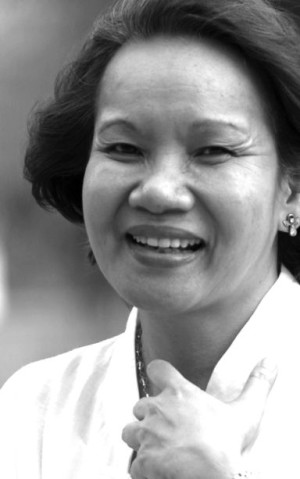Mother Ignacia, Mother Marie Louise and Marie Belen

LOGARTA
In this time when there is focus on those in the consecrated life, let us recall religious women who had a heart for females. Philippine History books cite Mother Ignacia Del Espiritu Santo who set up a place for the education of girls because this was neglected in the Spanish colonial period.
She was a real revolutionary. She refused to follow the traditional expectations of a Chinoy family — marriage. Having been guided by the Jesuit, Fr. Paul Klein who provided her the Spiritual Exercises of St. Ignatius’ Spiritual Exercises, she eventually decided to leave her home and lived near the Jesuits. Many native young females chose to join her because there was no congregation to accept them.
The new community experienced many challenges. They had very limited resources: “they even had to beg for rice and salt and scour the streets for firewood.” Although they had organized themselves into a community, recognition as a religious congregation took time.
“The expulsion of the Jesuits (their spiritual guide) was a big blow to them.” But they persevered “to live always in the presence of God and to develop a great purity of heart.”
Realizing the need and desiring to go beyond personal spirituality and extend to the community, “ the beaterio admitted young girls as boarders who were taught Christian doctrines as well as works proper to them.” Mother Ignacia Del Espiritu Santo, founder of the Religious of the Virgin Mary, has been described as “God’s handmaid who opened the door of the religious life to native women in the Philippines.”
We get to know about the founder of the ICM congregation Mother Marie Louise de Meester from Sr. Delia Coronel’s book, Remembering Mother Luisa. The book contains narratives regarding the entry and establishment of the ICM, starting with Tagudin in Ilocos. Albert Depre, CICM revealed how the nuns came to be in the Philippines, starting in the North: “Despite all the successes scored in Tagudin, an annoying problem remained to be solved: the education of the youth, the Christian renewal of family and home.
This problem existed in all mission stations. For the boys, schools were being opened here and there, but the girls were somewhat overlooked. It was felt that only Sisters could handle this task with hope of success.”
Another CICM Fr. Carlu described the early days of Mother Marie Louise in the Philippines: “The mission would undoubtedly have failed had they not been harnessed with the armor of the unlimited trust of the Foundress in Divine Providence and of her unparalleled example of courage and devotion. She herself taught classes daily and still found time to direct and sustain teaching efforts of her young and unexperienced companions and to listen to the tales of human misery which the people did not delay in coming to pour into her sympathetic ears.
Daily after classes were over, she went to the homes of the poor and the sick and brought healing and material help to them while comforting them and raising their hearts to God who completely filled her own.”
“No labor was too mean nor too strenuous for her zeal. The Sisters could not afford to pay a servant to keep house for them while they were in the classrooms. Consequently, they divided the work among them and Reverend Mother Foundress was as often as any of her companions sweeping and scrubbing floors, doing the washing and the cooking.
Yet, in spite of their extreme poverty and excessive labor which characterized those first months in the mission, they were very happy, for they were very fervent.”
Legal Alternatives for Women Center, Inc. worked with the Cebu Provincial Women’s Commission in producing in 2006 Heritage Cards, Cebuana Trailblazers (Sugboanang Tag-una).
Here Mother Marie Louise’s follower, Sr. Maria Belen Alcoseba has been described: “Sr. Maria Belen “Mabe” is the first female religious to organize a woman’s group Pundok sa Higalang Kababayen-an to work not only for women’s welfare but also to be the catalyst for community upliftment in Balamban, west Cebu. As she worked with them and their concerns in Balamban, she uncovered their talents, inspired and developed them for performances to promote their self-confidence, and inspired them to open these with prayers in indigenous and female-friendly liturgy.”
“With Balamban as their base, she worked with the women’s problems and realized that their victimization in domestic violence often resulted from drug abuse. She then linked with Kamatuoran, Inc., an anti narcopolitics group. The collaboration reached the level of the municipal government.
With these linkages Sr. Mabe and Pundok sa Higalang Kababayen-an motivated local officials to use both power and resources to actually serve the people.”
Inspired by these beautiful women, let us work together to build communities where both women and men can have genuine empowerment.
Disclaimer: The comments uploaded on this site do not necessarily represent or reflect the views of management and owner of Cebudailynews. We reserve the right to exclude comments that we deem to be inconsistent with our editorial standards.
